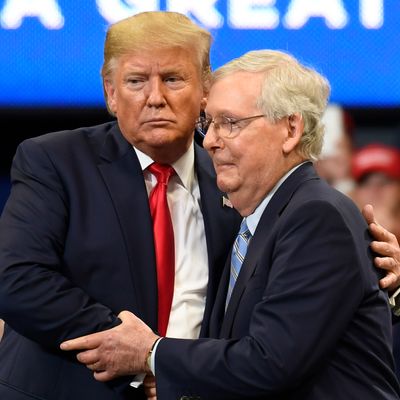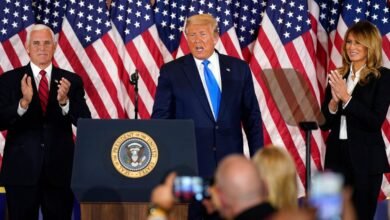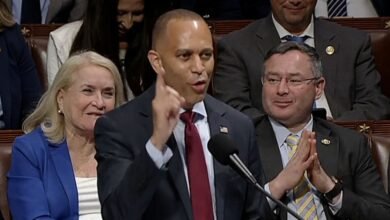

Photo: AP Photo/Susan Walsh
If there is one person who single-handedly held the power to banish Donald Trump from public life, and thus to save the republic from any threat he will return to power and use it as a weapon of vengeance, that person is Mitch McConnell. In the days after January 6, 2021, Trump had discredited himself with his party and stood on the brink of reputational ruin. The House had impeached him for his coup attempt, with ten Republicans joining in. With a small push, McConnell likely could have mustered enough votes to convict him and disqualify the former president from holding public office again.
Instead, McConnell decided such a vote, by splitting his party, would put it at a disadvantage. He convinced himself Trump would simply fade away on his own. And now, three years later, Trump stands as the prohibitive favorite to regain power, as McConnell has watched his influence ebb as he fades away into retirement.
The main story of every Republican who served in this era will be what they did as their party descended into authoritarianism. The defining story of McConnell’s career will be that he chose his own power over democracy.
Before Trump came along, McConnell was known, alongside a fanatical opposition to campaign finance reform, for articulating an unusually candid strategy for preventing bipartisan compromise under Democratic administrations. “It was absolutely critical that everybody be together because if the proponents of the bill were able to say it was bipartisan, it tended to convey to the public that this is O.K., they must have figured it out,” he explained to the New York Times in 2010. The following year, he told The Atlantic, “We worked very hard to keep our fingerprints off of these proposals. Because we thought—correctly, I think—that the only way the American people would know that a great debate was going on was if the measures were not bipartisan. When you hang the ‘bipartisan’ tag on something, the perception is that differences have been worked out, and there’s a broad agreement that that’s the way forward.”
This strategy had a side effect McConnell probably didn’t foresee. Maintaining a total blockade on bipartisan legislation couldn’t be justified in narrow terms, like opposing the terms and parameters of President Obama’s legislative goals. Republicans could only justify their refusal to negotiate by insisting the very goals Obama wished them to join in solving — economic stimulus, expanding health coverage, and reducing carbon-dioxide emissions — were merely pretexts for his actual goal of extending government control over everything. They had to whip their base into a hysteria that Obama had a secret agenda — Muslim, socialist, perhaps both — to destroy the very fabric of America.
The system McConnell helped create was one in which policy itself was irrelevant. Every discrete legislative question had to be melted into an all-consuming tribal war in which the only real question was who shall rule.
It was not that he wished for his party to have the chance to implement its own, clearly distinct vision of governing, as Paul Ryan did. McConnell was a procedural extremist but a substantive moderate compared with fellow Republicans. When he invoked the Republican agenda, he did so as a bogeyman: See the scary things that his party would do if the filibuster was removed? The world McConnell desired, and helped to create, was one in which each side would threaten disaster if the other held power, but little would happen other than tax cuts and confirming judges.
The political environment in which a political culture war replaced discrete policy differences turned out to be one Trump was supremely well positioned to navigate. What did it matter that Trump knew little and cared less about the details of policy? He understand that Republican politics had been redefined as a crusade to smash their enemies before they could destroy the country.
McConnell at first enlisted behind Trump with little objection. He blockaded an open Supreme Court seat after Antonin Scalia’s death in 2016, inventing a new “principle” that the Senate couldn’t fill a Court seat in an election year, before abandoning the principle to fill it with a Republican four years later following Ruth Bader Ginsburg’s death. McConnell calculated in part that the impetus of filling Scalia’s seat would encourage social conservatives to swallow their reservations and back Trump, which they did.
In September 2016, top intelligence officials held a grave briefing with leaders of Congress to warn of Russia’s interference, which included the hacking Democratic emails. McConnell, according to the Washington Post, “raised doubts about the underlying intelligence and made clear to the administration that he would consider any effort by the White House to challenge the Russians publicly an act of partisan politics.” He thwarted any chance to form a bipartisan front against Russian election interference.
Trump’s presidency brought a stream of evidence confirming the fears that he would abuse power, all of which McConnell ignored. Even the revelation that Trump had held up aid to Ukraine, one of McConnell’s few points of genuine interest, to blackmail the country into smearing Joe Biden did not dislodge his support.
When Trump refused to concede the 2020 election, instead concocting preposterous lies that it had been stolen, McConnell shrugged again. “A few legal inquiries from the president do not exactly spell the end of the republic,” he insisted. Indeed, Trump’s attempt to overturn the election was no different, somehow, than Democrats denouncing Russian election interference: “Let’s not have any lectures about how the president should immediately, cheerfully accept preliminary election results from the same characters who just spent four years refusing to accept the validity of the last election.”
As with most Republicans, the insurrection, which brought a violent mob into their own sanctum, briefly shocked McConnell’s conscience. But his indignation was short-lived. His response was to retroactively revise his own complicity in the plot, floating a self-serving narrative in the New York Times that he had been “under a false impression that the president was only blustering” and that “Mr. Trump would eventually bow to reality and accept defeat.”
After briefly, half-heartedly supporting Trump’s second impeachment in 2021, McConnell decided it was too much trouble. Instead he invented a transparent rationale that a president couldn’t be impeached after leaving office, reprising his favorite method of justifying his own power by inventing institutional rules. By May, McConnell even blocked the formation of a commission to investigate Trump’s scheme to steal the election. This time, unlike during impeachment, McConnell actually exerted himself, asking Republicans to support a filibuster “as a personal favor,” his highest-level request. The Senate commission was duly blocked.
It didn’t take long for McConnell to realize he had miscalculated. By continuing to insist he had won the 2020 election, Trump shut down any possibility of moving past him, as McConnell wanly hoped would occur in the absence of a messy intra-party fight. Indeed, Trump began using support for his coup attempt as a party litmus test to weed out any principled opponents. The only thing McConnell objected to about this process is that many of the Trump loyalists polled poorly with the public: He called this a “candidate-quality” problem — the risk of losing Senate seats being the only real downside of the party’s slide into authoritarianism that bothered him.
When Joe Biden took office, McConnell did support or tacitly permit a series of bipartisan legislative compromises, likely because he feared that another Obama-style total blockade would lead Democrats to end the filibuster. The final such effort, though, has stalemated. In response to transparently pretextual Republican claims that aid to Ukraine would sap resources from border enforcement, he threw himself behind a bipartisan plan to beef up border security, only to belatedly realize that pro-Russia Republicans didn’t actually care about the border. Instead, they wanted to avoid giving Biden a bipartisan win. McConnell, of all people, ought to have understood the motivation.
One side effect of the Republican Party’s long slide into extremism is that every new leader is decried as a radical and every departing one hailed as a statesman. As McConnell gives way to even more partisan, unprincipled successors, Washington will fete his integrity and decency. The heart of Mitch McConnell’s legacy is a small-minded cynicism that was all too typical of his party. He saw the danger of Trumpism and chose to use it to his advantage rather than fight.
Source link




